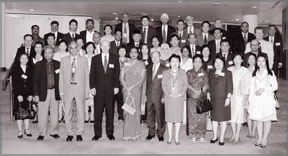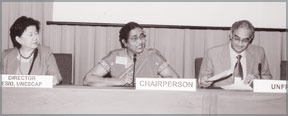Ageing population one of the greatest challenges
by Rosanne Koelmeyer Anderson
Population ageing will become one of the greatest challenges in the
coming decades with vast economic, social and other consequences. The
proportion of persons aged 60 years and over in the world will double
between 2000 and 2050, from 10 to 21 per cent.
Fifty two per cent of the world's older population lived in Asia and
the Pacific in 2002 and this will project a rise to 59 per cent in 2025.
This part of the region is the fastest ageing region of the world.
|

Country representatives who attended the conference |
The Population Division, Department of Economic and Social Affairs,
United Nations Secretariat says that as the tempo of ageing in
developing countries is more rapid than in developed countries,
developing countries will have less time than the developed countries to
adapt to the consequences of population ageing.
The impact of population ageing is increasingly evident in the
old-age dependency ratio, the number of working persons (age 15 - 64
years) per older person (65 years or older) that is used as an indicator
of the 'dependency burden' on potential workers.
Between 2005 and 2050, the old-age dependency ratio will almost
double in more developed regions and almost triple in less developed
regions. The potential socio' economic impact on society that may result
from an increasing old-age dependency ratio is an area of growing
research and public debate.
The seminar on the Social-Health and Economic consequences of ageing
population was held in Bangkok last week in collaboration with the
United Nations Economic and Social Commission for Asia and the Pacific (UNESCAP),
the United Nations Population Fund (UNFPA) and the United Nations
Department of Economic and Social Affairs (UNDESA) examined the existing
ageing-specific programmes and policies to explore the provision of
social protection and social security systems, including private sector
insurance to older persons, and will also identify the problems and
needs of the older persons in relation to informal and formal care as
well as long-term care services in the region.
|

Mrs. V. Jegarasasingham, Secretary Social Services and
Social Welfare chairperson of the conference |
The current demographic revolution is predicted to continue well into
the coming centuries. Its major features include the following: One out
of every ten persons is now 60 years or above; by 2050, one out of five
will be 60 years or older; and by 2150, one out of three persons will be
60 years or older.
The older population itself is ageing. The oldest old (80 years or
older) is the fastest growing segment of the older population. They
currently make up 13 percent of the 60+ age group and will grow to 20
percent by 2050.
The number of centenarians (aged 100 years or older) is projected to
increase 14-fold from approximately 265,000 in 2005 to 3.7 million by
2050. The majority of older persons (55 percent) are women. Among the
oldest old, 64 percent are women.
Striking differences exist between regions. One out of five
Europeans, but one out of twenty Africans, is 60 years or older. In some
developed countries today, the proportion of older persons is already
one in four. During the first half of the 21st century that proportion
will be close to one in two in some countries.
Population ageing as well as smaller family size and lower population
growth rates as a result of rapid declines in fertility and mortality
have emerged as new issues challenging several countries in the Asian
and Pacific region. Mortality reduction will continue to be an
overriding policy goal, which would further enhance the ageing process.
As a result, the number of older persons in the region is increasing at
the rate twice as high as the growth rate of the total population.
The social, economic and health implications of this absolute size of
older persons are so profound and far-reaching that improving living
conditions and providing income security, social welfare and medical
services to older persons are some of the major challenges faced by many
countries in the region.
Family life has also undergone a profound transformation in ,
South-East and East Asia. Family structures have changed because of
modernization, including industrialization and urbanization that
encompassed a majority of society in the region.
As a result, family size shrank as a function of decreased fertility,
delayed marriages, and increased divorce rates. At the same time life
expectancy increased due to advances in medical technology, improved
access to quality reproductive health services, wider vaccination
coverage, improved hygiene and nutrition standards as well as increased
access to safe water.
Changes in family structure combined with demographic ageing resulted
in formidable challenges in the provision of care for older persons,
usually provided by the younger family members.
Changing perceptions about the social status of older persons,
internal and international migration resulting in a decline of
inter-generational co-residency, the changing social roles of women in
society in addition to a reduced number of individual offspring as well
as overall rapid economic development, may have prompted state
institutions to reconsider care and support that were mostly provided by
family members and to conceive of possible state-based welfare measures
and/or private sector insurance systems for older persons.
Furthermore, many countries in the region do not have sufficient
national social security for older persons and families continue to
provide support to older people and in many societies of the region, the
tradition of older persons co-residing with their family members is
generally the norm.
However, traditional means of family support are steadily eroding in
most societies. As healthcare infrastructure is already weak in many
countries of the region, the additional burden of caring for older
persons will further stretch it. The rising number of older persons on
the one hand, and the declining number of the younger population on the
other will mean that there will be a shortage of caregivers for the
older population.
The seminar was opened by Ms. Thelma Kay, Director, Emerging Social
Issues Division, UNESCAP. The director in her address stated that the
declining fertility and increasing longevity resulting in population
ageing has become a challenging issue to many countries in the
Asia-Pacific region.
Mortality reduction particularly in the older ages will be an
overriding policy goal, which would further enhance the ageing process
and as a result the number of older persons in the region will grow
rapidly increasing from 410 million in 2007 to 733 million in 2025 and
to 1.3 billion in 2050.
****
Policy recommendations
The following policy recommendations for action were made by Mrs. V.
Jegarasasingham, Secretary Social Services and Social Welfare
chairperson of the conference :
1. Governments are encouraged to review and appraise the achievements
made in implementing the Madrid International Plan for Action on Ageing
(MIPAA), the Macao Plan of Action on Ageing for Asia and the Pacific,
the programme of Action of the International Conference on Population
and Development (ICPD), and the Fifth Asian and Pacific Population
Conference (APPC) Plan of Action on Population and Poverty.
2. Governments are encouraged to formulate policies and programmes
for older persons and their families through consultations with relevant
stakeholders, in the interest of creating national policy ownership and
consensus building.
A. Older persons and development-Governments should be encouraged to:
3. Raise awareness on issues pertaining to changes in age and sex
composition and its socio-economic and health consequences.
4. Facilitate the provisions for access to information, communication
and life-long learning for older persons;
5. Take appropriate measures to alleviate poverty in old age;
6. Increase awareness among younger generations about life-long
preparation for old age, including health and financial security;
7. Promote the continued work of older persons in both formal and
informal sectors and increase their earning potential through skills
training development and access to micro-credit;
8. Develop appropriate policies and programmes directed towards older
persons with special attention to rural areas in collaboration with
local stakeholders;
9. Formulate appropriate policies and programmes taken jointly across
all relevant sectors of society in promoting active ageing;
10. Provide support to older persons in vulnerable situations such as
those providing care to grandchildren orphaned by AIDS and older men and
women living alone;
B. Older persons and their families-Governments should be encouraged
to:
11. Promote and strengthen family cohesiveness and multigenerational
solidarity with mutual support as a key element;
12.Formulate policies that enable families ;
13.Alleviate family counselling to strengthen existing families and
to avoid family disintegration;
14. Implement appropriate programmes for health promotion and disease
prevention aimed at promoting the healthy ageing population;
15. Take measures to provided universal and equal access to
healthcare and establish community health programmes to address the
special needs of older persons;
16.Formulate and implement policies including financial incentives to
enable families to provide long-term care to older family members;
Ensuring, enabling and supportive environments-Governments should be
encouraged to:
17.Create barrier -free/age friendly environment for older persons in
order to create an inclusive society;
18.Promote the growth of older person organizations and other
community based organizations at the grass-roots level that can provide
social protection and social inclusion;
19. Enact legislation and strengthen legal efforts to ensure and
protect the rights of older persons; Future research needs:
20. Governments in collaboration with relevant international
organizations should be encouraged to undertake multi-disciplinary
research: a. The demand for assisted living as a consequence of family
disintegration, increased morbidity and disabilities of older persons;
b. different living arrangements for older persons, including the
advantage and disadvantage of familial co-residence and independ living
in different cultures and settings; c. Impacts of migration,
urbanization and globalization on older persons; d. Multi-pillared
system of income security and the employability of older persons; e.
Identification of good practices on ageing programmes and policies; f.
Abuse, neglect and violence against older persons and g. pension reform
policies, as appropriate, and its regulatory systems/consequences/impact
on older persons.
Review and appraisal of the (MIPAA):
21. Governments are encouraged to include both ageing-specific
policies and ageing - mainstreaming efforts in their review and
appraisal of the (MIPAA) and national strategies and identify emerging
issues and future priorities for policy actions related to population
ageing.
22. Governments as well as the United Nations system and civil
society are reminded to participate in a participatory bottom-up
approach to the review and appraisal of the Plan Action through inter
alia, sharing of ideas, data collection and best practices.
23. Governments are encouraged to use age-specific indicators, as
outlined in the guidelines for the review and appraisal of the MIPAA-Bottom-up
approach.
[email protected]
|
